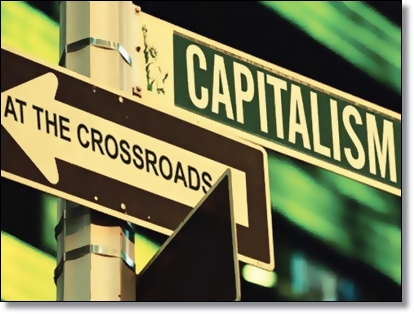Understanding Capitalism and Credit!

 |
| Graphics courtesy |
Today, the federal government spends $25 out of every $100 spent in the economy and state and local government spend $11 more. The central bank creates the money and manipulates its value. Almost all the major industries are subsidized in one way or another by the government and almost half of all households receive some kind of government assistance. Finally, the economic process itself is no longer driven by saving and investment. Instead, it is driven by borrowing and consumption.This is not Capitalism.
Market forces no longer drive the economy. The current system is government-directed. Government policy is determined through compromise processes between demanding and competing power blocks: big business, the banking industry, the military, the elderly and the general public, which, until recently, had grown to expect an ever-improving standard of living.
Deficit spending and fiat money, in other words extension of credit by instrument allows the government to satisfy all these competing demands for more than a generation. During that time, a key component of government policy has been to channel ever-greater quantities of credit to the household sector. As total credit expanded 50 times in less than 50 years, it created bloated wealth to falsely keep the American Dream alive. That extraordinary expansion of credit changed the nature of the economic system itself, leading to undue consumerism and material possession that although a feel good conducts, adds nothing to overall wellbeing of the people.
Capitalism became Credit and consumerism. The credit-based economic system is now in crisis because the household sectors are unable to bear their debt load. The gap between income and debt has become too great. To find a lasting solution is to possess realistic understanding of the nature of the economic system. Only then will it be possible to devise strategies to correct the faults.
The Six Functions of Money is as simple as ABC, and one does not have to have a degree to figure them out. The cure for US bloated economic system anchored on quicksand is to learn to spend less than one takes in.
The American idea of wellbeing calls for exaggerated sense of acquiring things that really do not matter. Take a look at each person's garage or house and see things that should never have been purchased. The notion of cutting one's coat according to their size is elusive to US consumerism fashioned on wrong notions of materialism, that we all can be great and are entitled.
What one sees in the attitude of the federal government is an extension of what happens in the various households - families. Before one is governor or president, they were once head of a household. Am I correct? The foundation of any successful country is etched in the families so when the families struggle, the nation invariably and inadvertently follows suit - they teeter and tether.
By Ejike E Okpa II
Dallas, Texas.
